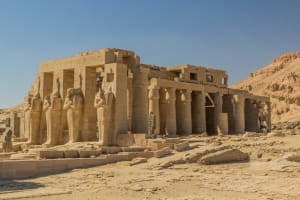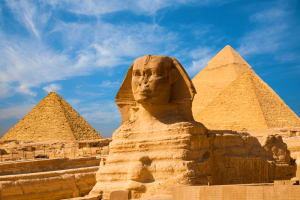












Egypt, officially known as the Arab Republic of Egypt, is a transcontinental country that spans the northeastern corner of Africa and the southwestern corner of Asia. It is the third most populous country in Africa, with a population of over 100 million people.
Egypt has a rich history and cultural heritage, with famous landmarks such as the Pyramids of Giza, the Great Sphinx, and the ancient city of Luxor. The country has been inhabited since ancient times and has seen the rise and fall of many empires, including the Pharaonic, Greek, Roman, Islamic, and Ottoman empires.
Egypt's capital and largest city is Cairo, which is home to over 20 million people. The official language is Arabic, and Islam is the dominant religion.
Egypt's economy is one of the largest and most diversified in the Middle East and North Africa region, with tourism, agriculture, and manufacturing being key sectors. The country is also a major producer of oil and natural gas, which are important sources of revenue.
Egypt has faced a number of political and social challenges in recent years, including political instability, economic inequality, and social unrest. The 2011 revolution led to the overthrow of long-time ruler Hosni Mubarak and the establishment of a new government. Since then, Egypt has been working towards political and economic reforms to address the challenges facing the country.
Telephone Code
20
Local Emergency Phone
Ambulance: 123; Fire: 180; Police: 122
Vaccinations
An International Certificate of Vaccination for yellow fever is required for travelers arriving from countries with a risk of yellow fever transmission and for travelers having transited through the airport of a country with risk of yellow fever transmission. See WHO recommendations.
Climate
Desert; hot, dry summers with moderate winters
Currency (Code)
Egyptian pounds (EGP)
Electricity/Voltage/Plug Type(s)
220 V / 50 Hz / plug types(s): C, F
Major Languages
Arabic, English, and French widely understood by educated classes
Major Religions
Muslim (predominantly Sunni) 90%, Christian 10%
Potable Water
Opt for bottled water
International Driving Permit
Suggested
Road Driving Side
Right
Tourist Destinations
Memphis and its Necropolis - the pyramid fields from Giza to Dashur; Luxor's Karnak Temple and Valley of the Kings; Islamic Cairo; Aswan; Deir el-Bahari; Feluccas on the Nile; Abu Simbel; Egyptian Museum; Edfu; Medinet Habu; White Desert; Siwa Oasis
Major Sports
Soccer, tennis, squash, basketball, handball
Cultural Practices
Try to avoid using your left hand to eat or greet people. Hail taxis with your hand extended rather than your thumb up.
Tipping Guidelines
It is customary to tip restaurant staff 10-15% of the bill. Tip taxi drivers around 10% of the total fare and housekeeping staff at hotels around $2 (USD) per day. Tip bellhops loose change for carrying your luggage.
Souvenirs
Papyrus scrolls and art, camel- and pyramid-themed items, copper and brassware, ankh jewelry, shisha pipes, pottery, handmade leather goods, silk, spices
Traditional Cuisine
Ful medames — a stew of cooked fava beans served with olive oil, cumin, and optionally with chopped parsley, garlic, onion, lemon juice, chili pepper, and other vegetable, herb, and spice ingredients; traditionally made in and served from a large metal jug
Geography
Area
total: 1,001,450 sq km
land: 995,450 sq km
water: 6,000 sq km
Climate
desert; hot, dry summers with moderate winters
Natural resources
petroleum, natural gas, iron ore, phosphates, manganese, limestone, gypsum, talc, asbestos, lead, rare earth elements, zinc
People and Society
Population
109,546,720 (2023 est.)
Ethnic groups
Egyptian 99.7%, other 0.3% (2006 est.)
Languages
Arabic (official), English, and French widely understood by educated classes
Religions
Muslim (predominantly Sunni) 90%, Christian (majority Coptic Orthodox, other Christians include Armenian Apostolic, Catholic, Maronite, Orthodox, and Anglican) 10%
Population growth rate
1.59% (2023 est.)
Government
Government type
presidential republic
Capital
name: Cairo
Economy
Economic overview
Africa’s second largest economy; 2030 Vision to diversify markets; improving fiscal, external, and current accounts; resilient to COVID-19 disruptions; underperforming private sector; poor labor force participation; stimulus expanded credit access
Real GDP (purchasing power parity)
$1.264 trillion (2021 est.)
Real GDP per capita
$11,600 (2021 est.)
Agricultural products
sugar cane, sugar beets, wheat, maize, tomatoes, rice, potatoes, oranges, onions, milk
Industries
textiles, food processing, tourism, chemicals, pharmaceuticals, hydrocarbons, construction, cement, metals, light manufactures
Exports
$58.339 billion (2021 est.)
Exports - partners
United States 9%, United Arab Emirates 6%, Italy 6%, Turkey 6%, Saudi Arabia 6%, India 5% (2019)
Exports - commodities
crude petroleum, refined petroleum, gold, natural gas, fertilizers (2019)
Imports
$94.039 billion (2021 est.)
Imports - partners
China 15%, Russia 7%, United States 6%, Saudi Arabia 6%, Germany 5%, Turkey 5% (2019)
Imports - commodities
refined petroleum, wheat, crude petroleum, cars, packaged medicines (2019)

















